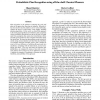Free Online Productivity Tools
i2Speak
i2Symbol
i2OCR
iTex2Img
iWeb2Print
iWeb2Shot
i2Type
iPdf2Split
iPdf2Merge
i2Bopomofo
i2Arabic
i2Style
i2Image
i2PDF
iLatex2Rtf
Sci2ools
108
click to vote
AAAI
2010
2010
Probabilistic Plan Recognition Using Off-the-Shelf Classical Planners
Plan recognition is the problem of inferring the goals and plans of an agent after observing its behavior. Recently, it has been shown that this problem can be solved efficiently, without the need of a plan library, using slightly modified planning algorithms. In this work, we extend this approach to the more general problem of probabilistic plan recognition where a probability distribution over the set of goals is sought under the assumptions that actions have deterministic effects and both agent and observer have complete information about the initial state. We show that this problem can be solved efficiently using classical planners provided that the probability of a partially observed execution given a goal is defined in terms of the cost difference of achieving the goal under two conditions: complying with the observations, and not complying with them. This cost, and hence the posterior goal probabilities, are computed by means of two calls to a classical planner that no longer h...
AAAI 2010 | Classical Planner | Intelligent Agents | Plan Recognition | Probabilistic Plan Recognition |
Related Content
| Added | 29 Oct 2010 |
| Updated | 29 Oct 2010 |
| Type | Conference |
| Year | 2010 |
| Where | AAAI |
| Authors | Miquel Ramírez, Hector Geffner |
Comments (0)

